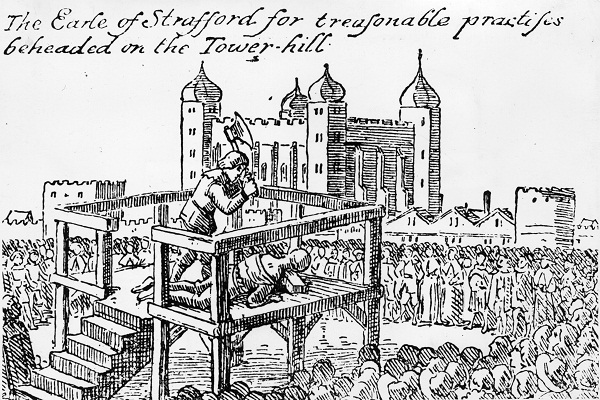‘Epitaph on the Earl of Strafford’
‘Here lies wise and valiant dust, Huddled up ‘twixt fit and just: STRAFFORD, who was hurried hence ‘Twixt treason and convenience. He spent his time here in a mist; A Papist, yet a Calvinist. His prince’s nearest joy, and grief; He had, yet wanted all relief. The prop and ruin of the state; The people’s violent love, and hate: One in extremes loved and abhorred. Riddles lie here; or in a word, Here lies blood; and let it lie Speechless still, and never cry.’
If Nick Clegg lived in bloodier times he might have ended up like Strafford by now. Executed on the eve of the civil wars, Strafford had a talent for alienating people who thought he was their natural ally. In part he suffered from other people’s fondness for oversimplifying complex political situations.
In the 1620s he opposed those policies of Charles I which he thought threatened the balance between Crown and Parliament. This balance, he believed, underpinned England’s unwritten constitution. When the king’s policies changed, Strafford dropped his opposition and accepted a high office.
Other opponents of the king thought him a turncoat and a sell-out, but Strafford had never shared their fear that Charles wanted to turn the country Roman Catholic. By personal conviction he was something of a puritan, but the religious conservatives in parliament (which is what the puritans were) mistook an overlap of interest for a deep ideological bond.
Strafford could have coped with this if he’d been able to maintain strong relationships with his new political bedfellows. Unfortunately he couldn’t. He was unshakably committed to guarding the interests of two people — himself and the king. He alienated half of the aristocracy by working as hard as he could to deny them their normal slice of the pie. He made enemies of the other half by assuming airs and graces normally reserved for the monarch. By the end of the 1630s, everyone thought he was unbearable.
As Charles’ reign headed towards disaster, Stafford became a scape-goat for every unpopular policy. Charles and Strafford were bound to each other, each dragging the other down. Strafford was beheaded in 1641 as Charles I lost control of Parliament, London, and eventually the whole kingdom. Eight years later, Charles himself was executed.
Cleveland tries to capture both the contradictions and the futility of Strafford’s career through a string of paradoxes. One reason Strafford infuriated people was because he seemed inconsistent. Cleveland’s epitaph registers this appearance without overt judgement. He was ‘A Papist, yet a Calvinist’ (that is, his political career seemed incompatible with his personal faith); he was ‘His prince’s nearest joy, and grief’ (Charles needed him more than ever as an adviser once he had become a massive political liability); ‘He had, yet wanted all relief’ (the king supported him to the end, but couldn’t save his life).
Cleveland leaves these paradoxes unresolved as ‘riddles’ without an answer. They ‘lie speechless’ (is that a pun on ‘lie’?). The poem adopts a perspective of fascinated indecision. The paradoxes of metaphysical poetry and, behind them, the oxymorons of Petrarchan love poetry, find a new subject in the awful ambiguities of civil war. When a nation turns on itself, can there ever be obvious answers?
Andrew Marvell’s poems on the civil wars are also ambivalent like this. It’s a type of response which can appeal to modern readers. We’re more easily struck by the horror of a conflict that happened three hundred and fifty years ago than interested in sorting the rights from the wrongs. It’s somehow reassuring to be reminded that most people at the time were just as perplexed. Not that we should find comfort in this. Most civil wars are fought unwillingly by populations dragged into them by minorities. The English civil wars were no different. It is part of their tragedy that they could reduce people to passive participants, bewildered by a world turned upside down. When politics becomes a spectacle something has gone wrong — especially when it’s an awful one.






Comments